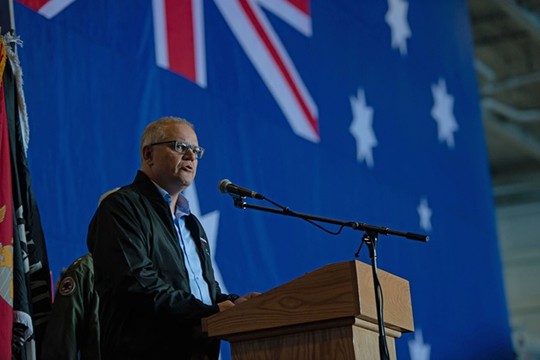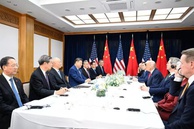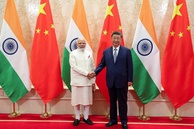Picture: Flickr, U.S. Pacific Fleet
The world is experiencing a strong political, economic, defence and social transformation. It has also affected the Asia-Pacific and Oceania. While Australia, the U.S. and the United Kingdom are trying to expand their collaboration under the AUKUS alliance, the PRC has made significant progress in strengthening ties with the Solomon Islands. However, China's diplomatic successes may affect the domestic political situation in Australia, where federal election will be held in May 2022.
Artyom Garin, Research Associate of the Center for Southeast Asia, Australia and Oceania of the Institute of Oriental Studies of the RAS, told us about AUKUS paradox, Australia’s diplomatic fiasco and the development of a new geostrategic environment in the South Pacific. The interview was conducted by international journalist Elizaveta Antonova.
The AUKUS alliance was established more than seven months ago. Have new spheres of interaction between Australia, the U.S. and the UK appeared during this time? Will it expand, for example, with Japan?
When announcing AUKUS, many focused on the issue of Australia's purchase of nuclear submarines. However, this alliance is aimed to broader collaboration between Canberra, Washington and London in defence.
Thus, the parties will join forces in the areas of hypersonic missiles and countering similar weapons of other countries. Here AUKUS intends to «defend itself» from the China's DF-17 missile. The alliance members will also expand interaction in the fields of electronic warfare, information exchange, and artificial intelligence. It turns out that now the Fifth Continent has become not only a bridgehead for the US actions against the PRC, but also a platform where weapons will be tested.
Canberra is strengthening collaboration within AUKUS due to concerns about the China's raising influence in the region. Moreover, the opinion about the need to «protect» the country from the «China threat» or militarization of the country is imposed on ordinary Australians, which causes them an ambiguous reaction.
Tests of Autonomous Underwater Vehicles are also planned within the framework of the trilateral alliance. It's expected that they will be held in 2023. Australia has also not decided on the choice of a type of nuclear submarine — British or American. In any case, most of the above intentions in the field of hypersonic weapons, submarines and other Canberra’s defence initiatives to expand the fleet or military personnel are a matter of decades and not even a few years.
I’m concerned about the potential AUKUS expansion, which may affect space. In particular, the attempts of Canberra and Washington to define it as a military area, as evidenced by the establishing of a new space command of the Australian Defense Forces. The desire to militarize space can lead to tragic consequences that humanity has not yet seen.
One way or another, AUKUS is an opportunity for the U.S. to gather the Anglosphere partners around itself, and for Australia's Prime Minister Scott Morrison, this alliance is a demonstration of ambitions. The country is trying to create the impression that such steps will make the Fifth Continent more independent, but this situation highlights Canberra's increasing integration into the U.S. military-industrial complex, as well as its stronger dependence on the position of overseas partners.
Speaking about the possible expanding and establishing of «AUKUS Plus» and inclusion of Japan there, in general, it has some technological capabilities to help the alliance develop hypersonic weapons. However, subsequently, the news of Tokyo's inclusion in the AUKUS was disproved by both the country's authorities and the U.S. Japan is not ready for this now.
Along with this, discussions were held about the Japan's inclusion in the Five Eyes intelligence alliance. Some believe that it could take a New Zealand's place, which is trying to balance between the U.S. and China. Because of this, the AUKUS countries may perceive Wellington's position as weak and see it as a «security hole», due to which China can gain access to the isolated intelligence alliance of the Anglosphere countries.
Why does Australia have a negative perception to the raising China's influence in the Asia-Pacific?
Such Australia's reaction is due to the transformation of the regional system that has built over the past 50 years. For now, inextricably linked with China's acquisition of greater economic, political and defense weight on a regional and global scale. The growing influence of the PRC challenges the more than 70-year-old dominance of the U.S. in the region, as well as the order that Australia is used to rely on when its foreign policy-making.
Probably, Canberra decided to confront the PRC right now, because they felt that in the future its opponent would be stronger. In addition, China continues to strengthen its influence in Oceania. Such a turn of events contradicts Australia's and the United States' interests, which consider the South Pacific as their own «sphere of influence».
China's new ambassador to Australia, Xiao Qian, recently spoke about a reset of bilateral relations, but this initiative didn't find a response from Canberra. Scott Morrison also didn't speak to the PRC's diplomat, as far as I know.
Nowadays, Sino-Australian relations are at an impasse. Moreover, Canberra has become hostage to its own aggressive rhetoric against Beijing. In recent years, Australia has become perceived as one of the main antagonists of China, which at the same time has become less independent and follows in the wake of U.S. policy. Australia has lost contact with the China's authorities but at the same time Washington maintains some kind of contact with Beijing.
Foreign policy and domestic politics are strongly linked. Election will be held in Australia in May 2022. Could they influence Canberra's foreign policy?
There is no doubt that the years of Scott Morrison's premiership fall at a time of serious changes both globally and regionally. The politician spoke in June last year about plans to prepare Australia for a world that will be «poorer, more dangerous and more disorderly».
Morrison also ensured continuity in the worsening of relations with China after the premiership of Malcolm Turnbull, whose government also opposed China's projects in the telecommunications and the extension of Beijing's influence in the Pacific Island Countries. The main features of Morrison's foreign policy can be called a focus on strengthening the alliance with the United States, expanding the interaction through Quad, and increasing defence costs.
Probably, Morrison sees a guarantee of the country's sovereignty in alliance with the United States, and perceives competition with China through the prism of ideology. The decisions he made, regardless of the change of government in the country, will in fact influence Australia in the future. However, time will tell whether they will lead the country to better or worse.
The Leader of the Australian Labor Party (ALP), Anthony Albanese, will oppose Morrison in the upcoming elections. It is unknown how the likely coming of Labor's government will affect Sino-Australian relations, but there will be no immediate changes. In addition, Albanese supported the AUKUS agreement. Against this background, it is unclear whether there will be a reset if Labor wins the election. However, some associates the ALP with supporters of China.
Often the results of the electoral race are judged by opinion polls, but in the case of Australia they often didn't correspond to the final result of the political struggle. I'll assume that there is a request for a change of government among Australians. To date, slightly more than 50% of the population are ready to vote for ALP, and about 45% are ready to vote for the Coalition. Moreover, the Labor is popular among young people.
However, Morrison's focus on militarization worries some Australians. The Coalition says citizens will have to make «a choice between a strong economy and a Labor opposition that would weaken it» or choose between a government that people know and a Labor that the don’t. But this was met with the opposite response: yes, people know the current government well, so they want a different one.
The geostrategic importance of the South Pacific is increasing every month. At the end of 2021, riots broke out in the Solomon Islands. Some associate it with the change of diplomatic recognition from Taiwan to the PRC. How did Australia and the United States perceive the security deal between Beijing and Honiara in 2022?
It is widely known that the Pacific Island Countries (PICs) are heavily dependent on foreign aid and trade. Australia and New Zealand account for more than half of the total funding of the South Pacific.
Nevertheless, the request for a more independent and diversified foreign policy is getting more and more prevalence in the Oceania. This fact was the confirmed by signing of the Boe Declaration in 2018. This document is evidence of the growing geostrategic importance of Oceania. In fact, the parties recognized that all new factors will be involved in the region, which will make the sub-regional architecture more complex.
The PICs are still perceived by Australia and the United States as a buffer zone, which is designed to protect them from an imaginary «attack». For Washington and Canberra, the strengthening of China's positions in the vast maritime spaces of the South Pacific is a threat to the status quo.
However, Oceania countries have a different opinion on this matter. They're convinced that China is also an influential actor and has a high level of economic influence in the South Pacific. China has already achieved a lot in establishing relations with the countries of the region.
The security deal between China and the Solomon Islands will be reflected in several dimensions at once. Firstly, the progress in relations between Beijing and Honiara represents a blow to Canberra's geostrategic positions. Australia perceives Melanesia as a «shield» protecting the country from a potential enemy, but now China has broken through this «protective barrier». Canberra has defiantly supported Taiwan recently, now Beijing has its own «lever of influence» on the Australia in such cases.
Australia called on the Solomon Islands to follow «Pacific family» diplomacy before the deal, but such statements from Canberra were perceived as an overbearing and colonial mentality point of view. The Solomon Islands is an independent country. Honiara doesn't need to consult with Australia before negotiating an agreement with another partner. In addition, the PICs maintain friendly relations with all actors in the region and the world, so such a position of Australia is alien to them.
Secondly, strengthening ties between China and the Solomon Islands is a fiasco for the current Australia's government. Contrary to Morrison's statements, the parties were able to conclude an agreement in the field of security, which Labor will certainly use to increase its ratings. Information about the deal was leaked to the information space earlier, but Canberra didn't send a high-ranking official to the Solomon Islands to fix the situation. Because of this, some link the deal between Beijing and Honiara with the inaction of Canberra.
Special attention should be given to the Bougainville Island, which is geographically the largest in the Solomon Islands group, but is part of Papua New Guinea. More than 97% of the residents of this autonomous PNG region voted for independence in 2019 and discussions on this issue are still ongoing. Against the background of Bougainville referendum, there were also concerns that the PRC could establish an economic or military foothold there. In this context, China has turned out to be at least in a double gain in terms of geostrategy in Oceania, which for Australia and its allies further aggravates the current situation.
Kurt Campbell, the US coordinator for the Indo-Pacific region, was going to the Solomon Islands. And here the experts should observe the Washington's reaction. The U.S. will clearly have concerns, but what tools should they will use: try to increase foreign aid to the Solomon Islands, conclude the same agreement, «accuse» the current authorities of supporting China, or will they try to divide Oceania into two camps? Obviously, the last two strategies are obviously destructive.
Australia was supposed to be a guide for the United States in Oceania, which doesn't have a strategy in this sub-region. However, the situation has shown that the US allies in different parts of the Asia-Pacific can't cope with the burden fell on them by Washington on «countering» with the growing power of China.
read more in our Telegram-channel https://t.me/The_International_Affairs

 10:48 26.04.2022 •
10:48 26.04.2022 •



























